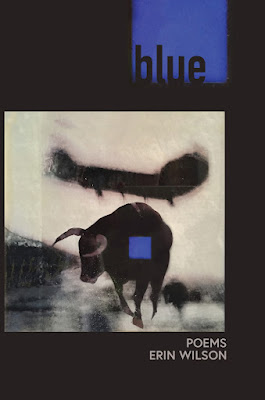Blue is a journey of grief and healing, hope and determination. It is the record of a child moving through depression toward adulthood, and a mother's love, her need to redeem that which wounds. Available now!
The generosity of others:
With each poem in Blue, Erin Wilson births and re-births what
it is to mother—from the years of innocence and hide-and-seek, to the
terror of raising a teen consumed with depression. She takes what is
most raw, most vulnerable, most undone, and brings it to the page with
precision and gem-like perfection. Intimate. Tormented. Urgent. Tender.
Infused with primal love. These are poems that tell the truth. I was hypnotized by blue. — Rosemerry Wahtola Trommer, Hush and Naked for Tea
Invigorating, inventive, and remarkably honest, Blue sparks
from “only the suggestion of a few bones” “a strong urge to know / each
magnificent unraveling spire in pure light.” These poems tell the story
of a life at risk of spilling over the edge of the page, capturing the
magnitude of a restless, relentless search for both wound and healing.
These are poems born of a kind of wrought faith that, despite all the
breaking, language still might bring us closer to each other, and closer
to ourselves. Wilson has given us a heady, intoxicating
experience, a fascinating collision of tradition and innovation, all
exquisitely layered in self, art, tenderness, and a rich testament to
the ever-present need for risk and empathy. — John Sibley Williams, As One Fire Consumes Another and Skin Memory
These poems are startling and joyful at once… With such daring,
Wilson illuminates a universe that hurts us to see. But she accounts for
the days in blue with such humility and restraint that it is a gift. To read this book is first to be saddened, winded, and then to be surprised by joy. — Emily Tristan Jones, editor Columba
Erin Wilson’s Blue is a work of radical worry that brushes
over the invisible fossil of location with a verse that paints sons and
mothers into corners so sharply that it separates survival and existence
long enough that losses grieve differently over the same portion of
brevity. I loved this book. For the vague science of its
radiance, for its reverse resurrections, for the timestamps its poetry
puts on the disorientation of the parent and the parented, for its
carrying of a sorrow that remains unpaid by sadness, and, most of all,
for trying to keep with color a nothingness from going bad. — Barton Smock, Skin To Skin In An Unmarked Life and Ghost Arson
(*Cover art, Blue Heart, Kathleen Loe.)




.jpg)